Cancer and Genomics
- 13th March 2019
- Posted by: Claudine Gabriele
- Categories: Articles, Bioinformatics

Cancer causes 9.6 million deaths worldwide every year. World Cancer Day aims to raise awareness of cancer and to encourage its prevention, detection, and treatment. Treatments for cancer have come a long way, and with genomics and next-generation sequencing methods becoming more commonplace, cancer treatments are becoming more targeted to the individual.
What is cancer in relation to the genome?
Cancer is when the genome of the cell becomes damaged in some way and causes the uncontrolled proliferation of cells. Due to damage to the DNA of the cell, it cannot stop replicating and so the cell continues to divide uncontrollably. The constant and non-stop creation of new cells causes tumours. While not all tumours are cancerous, malignant tumours are and can spread into both surrounding tissues and other organs through metastasis. In contrast, benign tumours (non-cancerous) do not spread throughout the body.
The damage can be caused by mutations in the genetic code, for example by a section of DNA getting deleted or an incorrect insertion of DNA into a coding section of the genome. Mutations or harmful changes can also occur during the process of normal cell division, as well as be caused by external factors.
As the genome holds the DNA code for each cell, errors can be found through genomic sequencing to see the difference between ‘healthy’ (non-cancerous) cells and cancerous cells.
Benefits of genomics
For cancer, genomics is a key field that is helping drive change in available treatments. Speeds for next-generation sequencing methods have reduced, allowing for almost real-time sequencing of genomes to take place.
Genomic testing can assess the mutational load of an individual, which could assist with the identification of specific proteins to better aim anticancer therapies, as well as potentially predict what an immune response will be to various therapies or checkpoint inhibitors.
Using genomics for individuals also allows for specificity of cellular targeting. Tumour cells are targeted largely without harming normal cells in the process.

Genomics in the clinic
With the use of genomics more widespread, the ability to find the section of damaged DNA has become easier. This has allowed for therapies to become more targeted, and has allowed them to be repurposed where possible.
Genomics has also highlighted similarities between cancerous tumours – HER2 gene mutations are common across ovarian, bladder and pancreatic cancers as well as a number of others. This opens up the possibility for repurposing existing therapies already in use where they are able to target HER2 mutations. This can reduce the burden on drug discovery companies, as novel compounds are not constantly needed and already in-use therapies can work for a wider section of patients.
With the ability to sequence tumours and work out the underlying genetic mutations, more personalised and tailored medical approaches can be taken as well. By reducing blanket use of therapies for certain tumours, therapies that are more likely to work for each individual can be pursued and ideally ensure that the best outcome for each patient can be achieved.
Cancer genomics at Fios Genomics
At Fios, we analyse data for a wide range of applications. We have extensive experience with oncology, at both pre-clinical and clinical stages, and our work has been featured on many papers for clients. Our bioinformatics services use state-of-art approaches for target identification, diagnostic testing and patient stratification, while the selection of the analysis approach is firmly based on each individual project.
If you have a cancer study that you would like bioinformatic help with, email us today or fill out our contact form and one of our team will get back to you regarding your bioinformatics needs.
References
Implementing Genome-Driven Oncology (Cell)
Cancer Genomics Research (National Cancer Institute)
How Genomics Is Shaping Precision Medicine in Oncology (National Cancer Institute)
The emerging clinical relevance of genomics in cancer medicine (Nature)
Leave a Reply
You must be logged in to post a comment.

